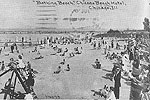|

South Lakefront
(continued)
In 1920 the population of South Shore was 31,832 and predominately
Protestant. The leading nationality groups were Swedish and English.
But there was already a considerable number of Irish and English
Catholics in the community. It was around this time that racial
change began to occur in Washington Park. The Irish who lived
in the communities along the "L" tracks moved out in
large numbers, and those who were upwardly mobile moved to South
Shore. By 1920 fifteen percent of Washington Park's population
was made up of black people.
The following decade saw the transformation of South Shore from
a Protestant enclave to an ethnically mixed Chicago neighborhood.
Once again the Washington Park influence was felt. In the early
1920s the dividing line between black and white Chicagoans in
Washington Park had been Garfield Boulevard; but as the decade
progressed blacks pushed across that boundary line. Jews quickly
left the Washington Park area and moved to South Shore following
the Irish who had followed the Protestants Many of the Jews settled
in the new apartment buildings under construction in the neighborhood.
By 1930 the population of Washington Park was 44,016, of which
ninety-two percent was black. The racial transformation of Washington
Park was complete. The ethnic transformation of South Shore quickly
followed.
The 1920s saw the population of South Shore more than double,
from 31,832 to 78,755. This was the result both of natural growth
and of white flight from the areas which were becoming part of
the city's Black Belt. Much of the natural growth resulted from
the opening of the Outer Drive and the development of the lakefront.
Developers constructed large apartment hotels along the
lakefront from Hyde Park Boulevard south (See Fig. 1).
«
previous
18
of 23
next
»
|
 |

|
 |


Figure 1:
Bathing Beach, Chicago Beach Hotel, c. 1912. »
|